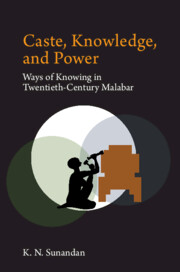Book contents
- Frontmatter
- Contents
- Acknowledgements
- Notes on Transliteration
- Introduction: Caste, Knowledge, and Power
- 1 An Ashari World of Knowing
- 2 An Ashari World of Ignoring
- 3 A Nampoothiri World of Acharam
- 4 Nampoothiris and the Order of Knowledge
- 5 Asharis and the Order of Knowledge
- Postscript: Towards an Artisanal Way of Practice of Knowing
- Bibliography
- Index
2 - An Ashari World of Ignoring
Published online by Cambridge University Press: 11 October 2022
- Frontmatter
- Contents
- Acknowledgements
- Notes on Transliteration
- Introduction: Caste, Knowledge, and Power
- 1 An Ashari World of Knowing
- 2 An Ashari World of Ignoring
- 3 A Nampoothiri World of Acharam
- 4 Nampoothiris and the Order of Knowledge
- 5 Asharis and the Order of Knowledge
- Postscript: Towards an Artisanal Way of Practice of Knowing
- Bibliography
- Index
Summary
By the end of the nineteenth century, various caste groups in the Malayalam-speaking region of Keralam began actively participating in the colonial educational institutions. Historians of the region have mapped various caste communities’ interactions with colonial knowledge under the category of ‘community reform’. Education was central to all the modern social reformers throughout India, starting from Jyotirao Phule to Ayyankali to dominant-caste Bengali reformers. However, a close observation of the Ashari world in the first half of the twentieth century tells us a different story. In this period, Ashari as a jati was an oppressed community and simultaneously aware of the emergence of the colonial modernity; however, by actively ignoring or avoiding the opportunities provided by the colonizers, Asharis resisted the temptations extended through various colonial institutions. Asharis neglected or avoided colonial intervention by maintaining carpentry as a practice of knowing, rather than transforming it as a process of knowledge production. This chapter explores the strategies through which Asharis mobilized the practice of ignoring and its affects and implications on the daily life of the community.
Ignorance and Ignoring
As discussed in the Introduction, the knowledge–ignorance binary was central to both the claims of domination of the colonialists and to the discourse of reform of various caste communities. The colonialists considered artisans highly skilled but ignorant of the modern ways of using tools and technology. According to Alfred Chatterton, Director of Industries, Madras, 1900–1908, ‘Caste restrictions, combined with ignorance and intense dislike to change of any kind have kept the artisans to their hereditary methods’, which he considered as obsolete and to be reformed through ‘external help’. E. B. Havell, a friend of Ananda Coomaraswamy and Abanindranath Tagore, and who can be considered a committed orientalist, was more appreciative than Chatterton of the capabilities of Indian artisans. He opined that the ‘most valuable industrial asset’ India possessed was ‘the skill of her handicraftsmen’. He explained:
It is of vital importance for India to retain all the accumulated skill of hand and eye: the problem for India is how to use the labour saving appliances not as a substitute for but as an auxiliary to handicraft—so that handicraft may be developed instead of being crushed out by the inventions of modern science.
- Type
- Chapter
- Information
- Caste, Knowledge, and PowerWays of Knowing in Twentieth Century Malabar, pp. 61 - 94Publisher: Cambridge University PressPrint publication year: 2023



